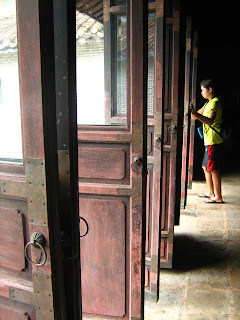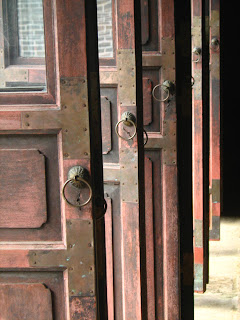We have had a number of great meals in Hue as we left the restaurants geared for tourists and explored the local food.
 In the morning we took a "dragon boat" on the Perfume river to Thien Mu Pagoda. Here, I am attempting to force Ha onto the gang plank, and for some reason, he wants me to come along with him.
In the morning we took a "dragon boat" on the Perfume river to Thien Mu Pagoda. Here, I am attempting to force Ha onto the gang plank, and for some reason, he wants me to come along with him. Ben, our class expert on Thien Mu Pagoda, tells us a little about it.
Ben, our class expert on Thien Mu Pagoda, tells us a little about it.Information from Ben's research report:
Thien Mu Pagoda is the tallest pagoda in Vietnam. It was built in 1601 by Nguyen Hoang. It has become an important pilgrimage site because one if its monks, Thich Quang Duc. In 1963 he drove to Saigon, poured five gallons of gasoline on himself, put a strand of wooden prayer beads around his neck, then set himself on fire to protest the mistreatment of Buddhists by the Diem regime in South Vietnam. He sat in a meditative, lotus position for ten minutes before he pitched forward.
Thien Mu Pagoda is the tallest pagoda in Vietnam. It was built in 1601 by Nguyen Hoang. It has become an important pilgrimage site because one if its monks, Thich Quang Duc. In 1963 he drove to Saigon, poured five gallons of gasoline on himself, put a strand of wooden prayer beads around his neck, then set himself on fire to protest the mistreatment of Buddhists by the Diem regime in South Vietnam. He sat in a meditative, lotus position for ten minutes before he pitched forward.
 People used to be able to walk the seven levels to the top of the pagoda, but now the passage way is locked.
People used to be able to walk the seven levels to the top of the pagoda, but now the passage way is locked.We walked to the back of the pagoda grounds to a shady spot, and there had a meditation lesson.
Guided meditation: Blessings or curses
In 1963 Thich Quang Duc got in his car, drove to Saigon, and lit himself on fire. How does one do that? Were his actions positive or negative?
There is a story in the bible: when the Jews escaped Egypt and wandered in the desert for 40 years, they came upon the land of Moab. The King of Moab feared them, and ordered is priest to go to the Jews’ camp and curse them. The priest went to their camp, but instead of cursing them, he blessed them.
My rabbi explains the important lesson here: at every moment, you have the choice – to curse or to bless. Every event is a blessing, even the painful ones, for they are often the most important lessons.
I heard a story about the Dalai Lama, the God-King of Tibet, who fled the Chinese to India in 1959, and has been a refugee ever since. Depending on your sources, one to four million Tibetans have died due to the Chinese occupation of Tibet. The Dalai Lama, believed by the Tibetans to be the reincarnation of Chenrezi, the God of compassion, was asked about the Chinese government. And he said that this had been one of his most important lessons, for it is easy to feel compassion for those similar to you or for those that you love, but to feel compassion for the Chinese government has been a challenge for him.
Sometimes you feel anger, jealousy, pain, or frustration
All those feelings are inside of us
No one is doing anything to you, or making you feel a certain way
No one else is responsible for your feelings
Each one of us is responsible for our own thoughts and feelings
Things happen. You have no control over that. But you do have control over how you respond.
Maybe the only power we ever really have is how we respond.
We then had a silent meditation and a short sharing afterward, and I mean short. Students really didn't have anything to say, and it was my fault. I really wanted to have this meditation at this site, but communication was not clear, and most of the students had gone back to the bus, thinking they were done with the pagoda tour. I brought them all back to the shady spot, but by then, I don't think they were too happy with me leading a lesson.
My lesson:
I got in the way of the learning experience because I didn't set up a situation where my students were open to the experience. What I envisioned narrowed my perspective, to where I was no longer flexible to what was actually happening.
 We then drove to Tu Duc's Mausoleum
We then drove to Tu Duc's Mausoleum Tu Duc's Mausoleum
Tu Duc's MausoleumInformation about Tu Duc, from Emily's research report:
Tu Du came into power in 1848. His reign lasted for 35 years, the longest in Vietnamese history. During his reign, Vietnam lost its sovereignty to France, which invaded in 1858, and controlled Vietnam for almost 100 years, until their defeat at the battle of Dien Bien Phu in 1954. Tu Duc had 104 wives and concubines, but no children.
 rice (I really liked the light, shining down through the plastic roof tarps)
rice (I really liked the light, shining down through the plastic roof tarps) Towels drying on a motorcycle outside of a barber shop
Towels drying on a motorcycle outside of a barber shop In the evening we went on a "Dragon boat" dinner cruise on the Perfume river, which was an opportunity for my students to dress up in their tailor-made ao dais.
In the evening we went on a "Dragon boat" dinner cruise on the Perfume river, which was an opportunity for my students to dress up in their tailor-made ao dais. Every year on the Perfume River dinner cruise, we pick a king and queen, who are then dressed up in appropriate costumes. Since we have two sets of twins in this year's class, we decided to pick the oldest of each set. But in Vietnam, the oldest twin is the one that comes out last, So Galen and Michelle were our King and Queen for the day.
Every year on the Perfume River dinner cruise, we pick a king and queen, who are then dressed up in appropriate costumes. Since we have two sets of twins in this year's class, we decided to pick the oldest of each set. But in Vietnam, the oldest twin is the one that comes out last, So Galen and Michelle were our King and Queen for the day.



















I like those doors, too!
ReplyDeleteHow beautiful everyone looks in their special clothes.
Noah was over for dinner the other night and he & Natan told me all about their memories of Hoian and Hue. Still such a highlight of their lives, both of them. (of course now Noah has other memories of there, too, from when he went back on his own)
104 wives and no children! That sounds like an interesting story ;-)